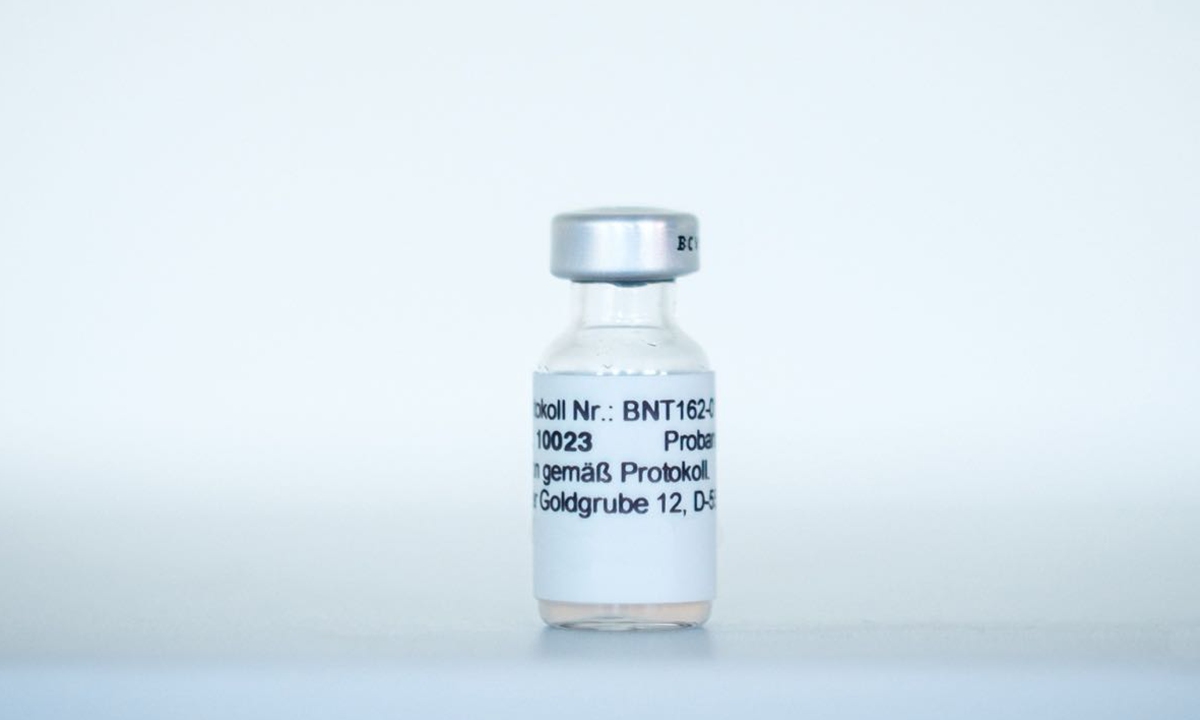
The COVID19 vaccine BNT162b2 co-developed by Fosun Pharma and BioNTech Photo: Courtesy of BioNTech
Fosun Pharm has submitted the clinical trial data of a COVID-19 mRNA vaccine it co-developed with German BioNTech and relevant materials to China's state regulator for rolling review, a source close to Fosun told the Global Times on Sunday. This is part of China's plan to import the first foreign-made COVID-19 vaccine.
The Wall Street Journal on Friday reported that the Chinese regulator is expected to approve domestic distribution of the shot within the next 10 weeks, but neither Fosun nor BioNTech would confirm the timeline to the Global Times, as the schedule is not fixed and depends on the procedure of regulators.
"The developer is in close communication with regulators to facilitate the approval process," said the source.
Amid the appeal for more vaccine options among some expats in China, experts said that approval of such imports could enrich the domestic vaccine pool and help facilitate reciprocal vaccine recognition among countries that will benefit foreigners coming to China and even the 2022 Winter Olympic Games in Beijing.
Many expats living in China have wanted some foreign-made vaccines for easier recognition when they return home. China's approval, if granted, would showcase its caring for foreigners, Feng Duojia, president of the China Vaccine Industry Association, told the Global Times on Sunday.
Once approved, BioNTech and Fosun would initially plan to supply the vaccine from BioNTech's state-of-the-art production facilities in Germany, and BioNTech may consider shipping the bulk vaccine substance to the Chinese mainland for further packaging, the Global Times learned from the German firm on Sunday.
"In the Chinese mainland, there are few precedents for approving a vaccine that was developed and produced entirely in other countries, still less such an innovative mRNA vaccine. Traditionally, the drug regulator would require local late-stage trials, which would be impossible in the current situation. This approval, if granted, would be a historic breakthrough," said Feng.
Feng denied that the approval decision was delayed due to "vaccine nationalism" as some Western media have claimed and hyped, saying that assessments are made based on science and strict domestic standards.
"In war, it is always good to have more weapons!" This is how Shao Yiming, China's leading physician-scientist and immunologist serving at the Chinese Center for Disease Control and Prevention, described the potential import of foreign-made mRNA vaccines.
Shao said that the imported mRNA vaccine would pave the way for mixed jabs in sequential inoculation, considering its efficacy. Relevant studies on the mixed use of different types of shots are under way in China, Shao noted.
The Phase-II clinical trial of the vaccine named BNT162b2 - widely called Pfizer-BioNTech's vaccine in Western media - has been completed in China. Fosun linked it with the obtained Phase-III trial data overseas to apply for approval, the Global Times learned from the company.
Such a phase of clinical trials, with 960 participants, observes the basic vaccine effectiveness on participants, especially seniors, as half of the participants are aged 55 to 85.
The vaccine was approved in January for emergency use in China's Hong Kong Special Administrative Region.
At same time, China's homemade mRNA vaccine is to accelerate Phase-II trials overseas next month. Feng expected that the vaccine, co-developed by Suzhou Abogen Biosciences and Walvax Biotechnology, to be available for public by the end of the year.
Being able to be stored and delivered in the usual range of 2-8 C will make this domestic ARCoV version stand out from Western-dominated mRNA vaccines made by pharmaceutical giants Pfizer-BioNTech and Moderna, which require much lower temperatures and more rigorous temperature controls.




